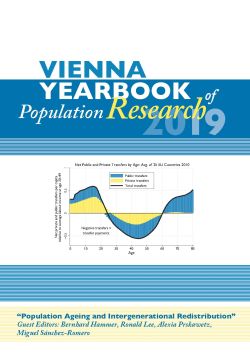
Vienna Yearbook of Population Research 2019, pp. 009-036, 2019/12/02
Special issue on Population ageing and intergenerational redistribution

In this paper, we analyse the impact of population ageing on the sustainability and the intergenerational fairness of public fiscal policy in three selected European countries (Austria, France, and Spain). We use NTA and NTTA data, and introduce these data into a large-scale general equilibrium OLG model with realistic assumptions regarding demographic trends and changes in population structure. The results for sustainability show a sharp increase in the share of public expenditure to GDP for the main programmes of the welfare state. In the three countries analysed, public policies (e.g. education, health care, and pension benefits) redistribute income from younger individuals to older individuals. Our findings indicate that these policies redistribute more resources to older individuals in Spain and fewer resources to older individuals in Austria. We consider the effects of several reform scenarios, including simulations in which the statutory retirement age is raised and the tax base for financing health care expenditures are changed. We also describe the consequences of the population having a fixed level of educational attainment.